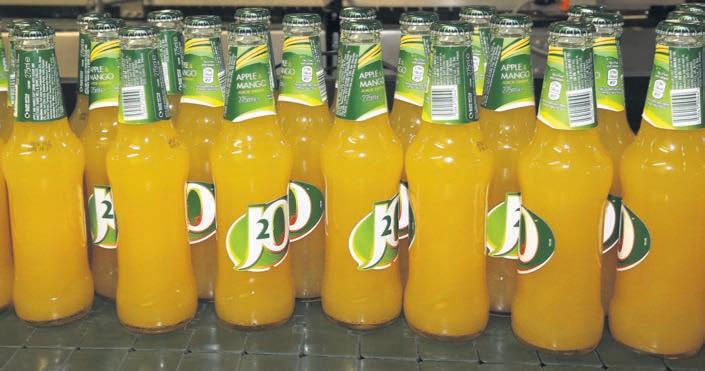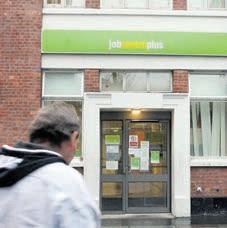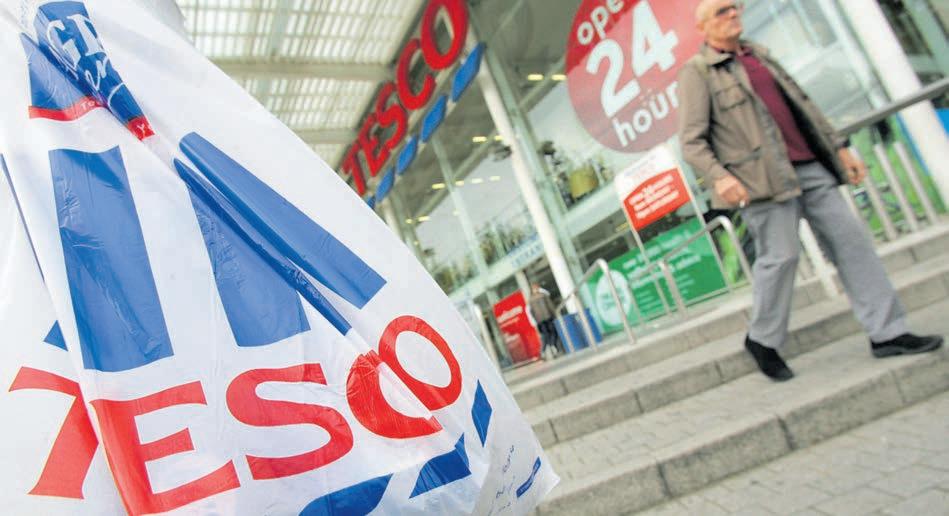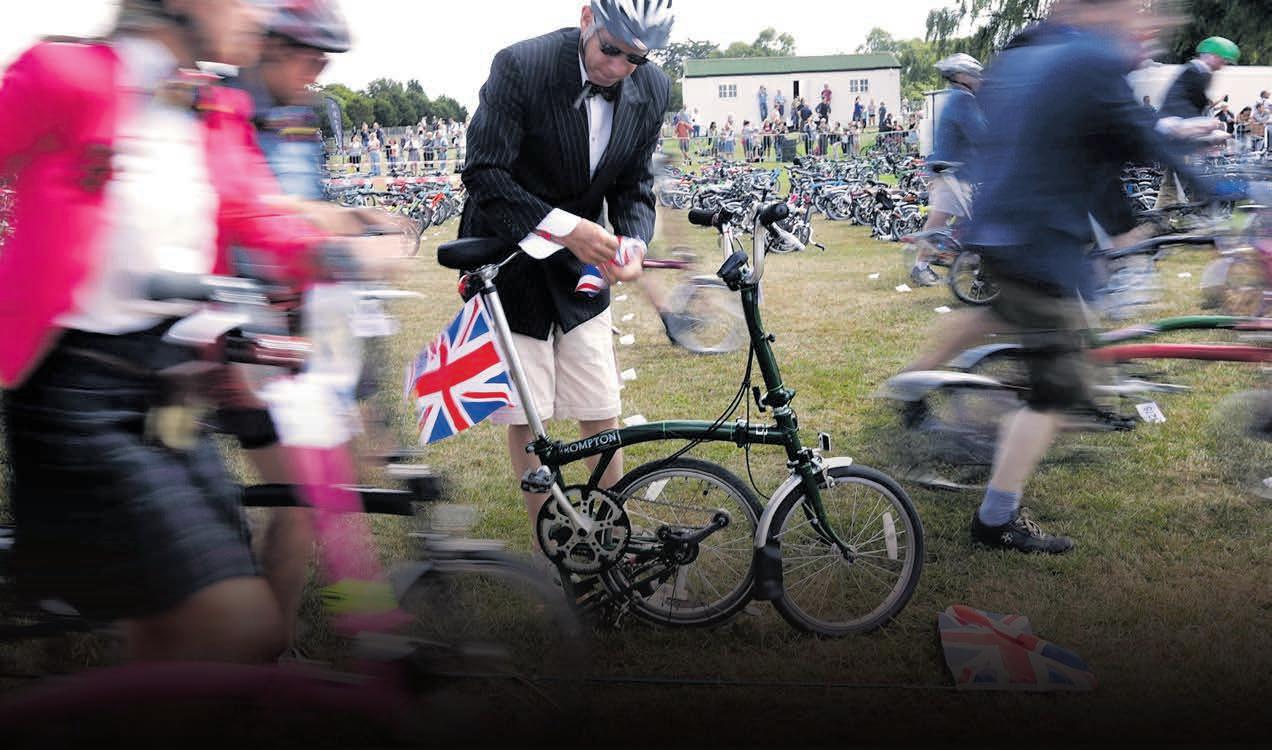LONDON’S BUSINESS NEWSPAPER
CHEERS TO SPRING OUR GUIDE TO ROOFTOP BARS AND CHILLED REDS P18-P19







VODAFONE shares tanked seven per cent yesterday despite the firm’s new boss declaring the company “must change” and announcing 11,000 job losses.
Margherita Della Valle, who took the job on a permanent basis only a few weeks ago, set out her new “roadmap for Vodafone” yesterday and said “the comparative performance (of the firm) had worsened over time”, even in a telecoms sector that has struggled more broadly for years.

“We are more complex than we need to be,” the company said alongside full year results as Della Valle announced a widespread headcount reduction over the next three years.
The telco giant announced disappointing results in Germany, Spain and Italy and whilst full year pre-tax profits of just
north of £11bn looked healthy on paper, they were artificially boosted by the £6bn sale of parts of its Vantage Towers business. Revisiting and reshaping the German business is considered a priority.
The share price fell to a 16 year low.
Vodafone is considering a deal with CK Hutchison, the owner of the Three mobile network, which would merge the two’s UK operations and create the UK’s biggest mobile network operator. But yesterday’s roadmap said the company would “rebalance” the organisation to maximise the potential of Vodafone Business, which has a strong position in a large and growing market as organisations digitise.
“Lacklustre performance has been something markets have come to expect from Vodafone of late, and full year results
didn’t buck the trend. Higher energy costs and continued weakness in Germany meant underlying cash profit came in below the recently downgraded company guidance,” said Matt Britzman, an equity analyst at Hargreaves Lansdown.

He said the plan “makes sense on paper, but markets will need to see tangible results over the coming year before they get more excited.”
As an internal appointment with more than two decades of experience within Vodafone, Della Valle was something of a surprise choice to lead the firm’s transformation after the sudden departure of Nick Read in December of last year.
Read had been under pressure from activist investors throughout his tenure, with Cevian amongst the most vocal critics.

Vodafone’s struggles are not unique in the industry. BT’s share price has slipped 25 per cent in the past five years, compared to 54 per cent for Vodafone.
CITY OF LONDON SET TO DIM THE LIGHTS (literally, at least...)

WITH London’s equity markets under pressure and business owners calling for the capital to become more globally competitive, you’d be forgiven for thinking the City is turning out the lights. And that will soon be happening literally, after the City of London Corporation signed up to a global standard on how cities should be lit –with a focus on embracing greener lighting techniques and minimising light pollution.
The City Corporation has been

consulting on a separate policy which will require developers to submit a detailed strategy for how buildings are lit, and a Considerate Lighting Charter will also ask existing property owners and occupants to make a commitment to turn lights off when not in use.
“Our strategy is aimed at ensuring an intelligent and sensitive approach to lighting that balances the safety and accessibility of the City with the preservation of local amenity and character,” said the Square Mile’s chairman of the planning and transport committee Shravan Joshi.
CHARLIE CONCHIE
THE CITY minister yesterday threw his weight behind efforts to boost the pay packets of the country’s top bosses as a debate around pay in the City gathers steam.
The compensation of executives at the UK’s top listed firms has been a
topic of hot debate in recent weeks as regulators and officials look to revive London’s status as an international business hub.

In a speech yesterday on the UK’s status as a global financial centre, organised by financial services lobby group UK Finance, City minister Andrew Griffith backed a
reappraisal of executive pay.
“Remuneration here needs to be competitive,” he said. “We want to –we need to – attract the brightest and best to the shores, and the last thing we want to do is to drive them away.”
Griffith’s comments follow warnings from London Stock
Exchange chief Julia Hoggett earlier this month who said that attracting talent was “hampered by the advice and analysis of the proxy agencies and some asset managers voting against executive pay policies, even when those pay levels are significantly below global benchmarks”.
The warnings have been brought into sharp relief during this year’s AGM season after a series of shareholder rebellions and warnings from proxy groups.
Glass Lewis called for shareholders to reject bosses’ pay plans laid out by FTSE 100 firms Unilever, Barclays and Rolls-Royce.
STANDING UP FOR THE CITY
statement of intent, but the early signs at least are perhaps more promising than the share price slip yesterday.
can not be accused of gently settling in to the top job of the struggling telco. Her missive to the City yesterday was about as brutal as a CEO can be about their own company without going into full Gerald Ratner territory. It requires parking a degree of scepticism –as an internal candidate and former CFO prior to taking the big job, one has to assume the strategic decisions that led to a too-complex, underperforming business were not entirely somebody else’s –but as a mission statement it looks good on paper. Whether it delivers is a different matter entirely.THE CITY VIEW
transforming Aviva, simplifying the various wings of the business, is a good model for many a new CEO to follow.
Della Valle’s issue though may be more about the business she’s in than her leadership of it. Telcos are notoriously disappointing for investors –returning precious little, and with shareholder value being gradually eaten away at.
Della Valle can draw inspiration from elsewhere in the City; Amanda Blanc’s strategy of
Transforming Vodafone, which in the UK at least may include a mega-merger with Three, will be hard graft indeed. She’ll have to be as uncompromising within the business as she was in her first
Of course, if she succeeds, she’ll deserve both a medal and an adequate pay packet. It was welcome to see Andrew Griffith drop the populism that has made Westminster rather turgid in recent years and embrace the idea that the brightest and best will need to be compensated properly. The Square Mile’s future will not be decided by an extra million or two bumped on top of the salaries of a few CEOs at our biggest businesses, but it is endemic of Britain’s nervousness to celebrate success. Let’s hope the government is willing to go to bat for the City more often, rather than falling into lazy stereotypes.



THE CONFEDERATION of British Industry (CBI), the lobbying group dealing with accusations of sexual misconduct, has hired a new executive to crack down on its toxic culture.
Chief people officer Elizabeth Wallace (pictured) has been hired to implement a series of reforms at the under-pressure trade body.

It comes after the CBI fired its director general and other members of staff over alleged wrongdoing.
More than a dozen women who worked for the CBI have alleged to The Guardian newspaper they were sexually harassed by colleagues.
Two allege they were raped.
It has sparked a major crisis for the CBI, which has suspended most of its oper-

ations and promised to come back to members with a plan for the future in June.
The board also tasked lawyers at Fox Williams to investigate its internal culture, flag any issues and make recommendations for how it can improve.
Wallace faces the task of implementing the lawyers’ 35 recommendations, one of which was the creation of her position.
She will sit on the CBI’s executive committee and report directly to the board about the CBI’s workplace conduct and culture.
Wallace formerly worked for private equity firm Hg and investment company Blackrock.
“Her role will be integral in reforming our people strategy – defining our shared values as we collectively recover from the challenges of recent weeks,” said new CBI director general Rain Newton-Smith.
THE MAKER of Robinsons and Pepsi Max has hailed a jump in sales following price rises and growing demand for sugarfree soft drinks. Britvic, which also owns household brands including J20, Fruit Shoot and Tango, said total revenues in Britain jumped by a tenth over the six months to the end of March compared with the previous year. Tango also sold well.
GUY TAYLOR
BRITISH AIRWAYS and Virgin Atlantic look set to cash in as departures from the UK to the US are set to return to prepandemic levels this month, new flight data shows.
Departures from the UK to the US are set to hit 99 per cent of
2019 levels this month, according to new data from the aviation analytics firm Cirium.
British Airways is anticipating the highest share of the travel boom, taking in 31 per cent of the transatlantic bookings, while Virgin Atlantic is set to get 16 per cent, Cirium’s data showed. The findings come after the US
announced that it would finally drop all pandemic restrictions.
“The relaxation of Covid-19 requirements last week makes visiting the US even easier and will provide a boost to transatlantic customer demand as a busy summer approaches,” a spokesperson for Virgin Atlantic said.
Keeping oil and gas flowing where and when it’s needed and increasing investment in the transition to lower carbon energy. That’s our strategy. Right now, we’re working towards increasing our number of rapid and ultra-fast chargers fivefold by 2030, helping the UK reach its goal of 300,000 public chargers. And, crews are operating a drilling rig, destined to help one of our existing facilities keep delivering the energy needed to meet critical demand.


THE BOSS of Krispy Kreme doughnuts has shrugged off the impact of new UK regulations on unhealthy food in supermarkets, insisting that consumers could simply be “trained” to look elsewhere in shops for their sweet treats.

Major retailers have been banned from placing high fat, sugar or salt items near prominent store locations such as checkouts in a shakeup of food rules in effect since October.

But doughnut kingpin Mike Tattersfield played down the impact of the new rules.
“You do have a short-term displacement but the opportunity starts to be that you just continue to train your customer in different parts of the retailer and other retailers that we are not in today,” Tattersfield told the Financial Times, adding that “customers still continue to look for what we do”.
He said: “I don’t see the world changing to kale cake for their break
A RECORD number of Brits are returning to the workforce in a sign that labour shortages that have held back economic growth and pushed up inflation are starting to unwind, official figures released yesterday show.

A net 251,000 people flowed out of economic inactivity in the three months to March compared to the previous quarter, the highest total the Office for National Statistics (ONS) has recorded since it started monitoring the data.
Since the Covid-19 pandemic, Britain has been grappling with an unusual increase in people dropping out of the jobs market altogether.
Other countries in the G7 have registered increases in worker participation.
Economic inactivity – which refers to people out of the job and not looking for one – has jumped since the start of the virus and the ONS yesterday said the rate was up 0.8 percentage points over the same period.
Experts have identified several rea-
sons for the spike in idleness, including long-term sickness possibly related to patients being unable to receive routine care as a result of the enormous NHS backlog.
The ONS said the volume of people within the economic inactivity cohort due to persistent sickness climbed to a record high last quarter of just over 2.5m. There has also been a jump in older workers taking early retirement and a rise in the student population, each of which have raised eco-
every single day. No disrespect to kale, but it’s not that much fun to share.”
Restrictions are expected to increase in coming months and years –including on buy one get one free deals and TV ads – but Tattersfield said he would still be pushing for growth in the UK.
Krispy Kreme’s products are on sale in supermarkets like Tesco and Sainsbury’s as well as its own stores, while the company retails in 32 countries worldwide. International profits were hit by inflation.

CHRIS DORRELL
CORPORATE insolvencies dropped off in April as business confidence seemed to improve but experts warned that the drop may not signal better times ahead.
According to new figures from the Insolvency Service, 1,685 companies went insolvent in April 2023, a 15 per cent fall on the same month the previous year. This was also down from the 2,457 insolvencies in March.
THERE are some signs that Britain’s red hot jobs market is calming down.
That’ll please officials at the Bank of England, who, remember, are trying to make people and businesses (on average) a bit worse off to tame inflation.
The drop-off in insolvencies was driven by a fall in creditors’ voluntary liquidations (CVLs), by far the most common type of insolvency. CVLs were 23 per cent lower than last year.
nomic inactivity rates.
“The recent drop in inactivity has been driven by students looking for part-time work and a full reversal of the rise in early retirement seen during the pandemic, both likely due to cost of living pressures,” Samuel Tombs, chief UK economist at Pantheon Macroeconomics, said.
There were also early signs of some firms trimming staff (see graph).
Wage growth which, in cash terms, has been rising rapidly for around a year, didn’t spring another surprise for onlookers.
Private sector workers pocketed an average seven per cent jump over the last year, in-line with Threadneedle Street’s new forecasts put out last week.
Across the entire labour market, pay increased 5.8 per cent, matching the
City’s expectations. No prizes for correctly guessing who bagged the largest pay increase of the last year (bankers, at 8.8 per cent). The gap between private sector and public sector workers’ pay increases has narrowed substantially over the last few months – it’s now down to 1.4 percentage points from around four percentage points last winter.
On balance, these Office for National Statistics numbers revealed the expansion in workforce participation hasn’t put a proper dent in pay increases – yet.
JACK BARNETTPwC’s Carla Matthews said that “on the surface” these figures look “encouraging”, reflecting increased business confidence and a more optimistic view of the economic outlook. But Matthews warned that “we’re not out of the woods yet”.
“The trading environment remains challenging for business, and while energy costs are starting to drop, both inflation and the cost of servicing debt remains stubbornly high… the outlook for the rest of the year may still be turbulent,” she said.
PwC’s analysis suggested that approximately 99 per cent of liquidations in the first quarter of this year have been at firms with £1m turnover or less.
JESSICA FRANK-KEYES
THE UK government must address labour shortages and make sure regulations don’t weigh food producers down to help ease food price inflation, an industry lobby group has warned.
Downing Street yesterday hosted a Farm to Fork event at No 10 with
retailers, traders and producers invited, as Rishi Sunak announced greater protections for farmers in future trade deals.
Food and Drink Federation chief executive Karen Betts called on ministers to urgently look at regulations, border checks and skills shortages.
Betts told City A.M. that while the
summit was a “constructive first step” it was “a pity there wasn’t more of a laser focus on immediate issues and the drivers of inflation”.
She added: “Action to fill labour and skills shortages and to simplify current and upcoming regulation, as well as simplifying post-Brexit labelling changes, would help to drive down prices.”




























BRITISH bakery and fast food chain

Greggs said yesterday it has seen strong sales growth once again in the first months of 2023, as it continued the rollout of new shops, longer trading hours and added extra options to its menu.

Greggs said that total sales in the 19 weeks to 13 May 2023 were £609m, up from £495m on the previous year, despite a “challenging” macro-economic climate.
“Menu development” was a key factor in its growth, according to the fast food chain, with sales of hot food and snacks such as chicken goujons, wedges and pizza proving popular with customers.





















It also recently announced a growth in its plant-based offerings with a new vegan mexican bake the latest addition to the menu.
The firm’s share price is up a third over the past twelve months, though it slipped by three per cent yesterday amid warnings on the wider economy.





























Market analysts praised Greggs for innovating – and for closing 26 outlets in the first 19 weeks of 2023 to ensure the focus remained on the most profitable stores.





Russell Pointon, director at Edison Group, said “Greggs’ value proposition, combined with the introduction of innovative new products like chicken goujons and the vegan Mexican chicken-free bake, continues to resonate with consumers”.




















Meanwhile, Russ Mould, investment director at AJ Bell, commented that “while it will forever be associated with the sausage roll, Greggs continues to see menu innovation and the punters are loving it”.
The firm also won a battle to open a Leicester Square store open until 2am.
CITY A.M. REPORTERS
BOTH ALDI and Tesco made moves to lighten the load on shoppers yesterday as the supermarket price war continues.
Tesco has announced another round of price cuts on its own-brand pasta and cooking oil as it sees deflation making its way through to

cupboard essentials.
And Aldi confirmed they would drop the price of items like macaroni, penne pasta and vegetable oil as their constituent parts begin to come down in price.
Supermarkets are at the frontline of the UK’s economic underperformance, with inflation eating into margins and grocers
forced to keep prices low to attract penny-pinching consumers, with profit expectations being reduced across the board.






Tesco group chief product officer Ashwin Prasad said: “As we see deflation coming through on key cupboard essentials such as pasta and cooking oil, we’re pleased to pass on these savings to customers.”






JACK MENDEL
CIGARETTE maker Imperial Brands yesterday reported a 27 per cent spike in operating profit on last year, while its foray into vaping and e-cigarettes also proved lucrative.

The London-listed firm said it made £1.53bn operating profit in the six months ended 31 March, with revenue for its ‘next generation products’ (NGPs) offering an alternative to tobacco up by a fifth.
Imperial Brands did, however, say its

volumes continued to be impacted by both the tail end of the pandemic and exit from Russia last year, as well as investment in NGP.
Shares dropped around 1.5 per cent.
The results mark the third year of the firm’s five-year strategy launched by chief Stefan Bomhard in 2021, which largely focuses on a reset in NGP products in a bid to maintain profits long term.
Bomhard said the company was now “moving from the initial foundation-building phase to a period
of improving financial delivery”.

“We remain strongly committed to an ongoing programme of shareholder returns and will complete our initial £1bn buyback during the second half,” Bomhard said.
Chris Beckett, head of equity research at Quilter Cheviot, said the results were “a good reminder, for those without ethical investment considerations, of the attractions of a tobacco stock – low valuation, strong cash flow, a high dividend yield and share buybacks”.
Big tobacco brands are moving their focus to next generation smoking habits
NUPUR ANAND AND NIKET NISHANT
JP MORGAN CEO Jamie Dimon said that it is “unlikely” that the bank will acquire any other struggling lender, weeks after it acquired the failed First Republic Bank.
“It [First Republic] will further help advance our wealth as well as other initiatives,” Dimon said at the bank's annual shareholder meeting yesterday, adding that they are in the process of integrating the lender.
Dimon’s latest statement comes just two weeks after JP Morgan bought a majority of First Republic Bank’s assets in a rescue effort backed by the US government.
First Republic was the third major US institution to fail in two months, and JP Morgan agreed to take $173bn (£138.5bn) of the bank’s loans, $30bn of securities and $92bn of deposits.
GUY TAYLOR
BROMPTON, the manufacturer of London’s iconic folded bikes, is set to sell a £19m stake in the firm to the Business Growth Fund (BGF), as it looks to accelerate its expansion.
Chief executive Will-Butler Adams told The Times that it would announce the sale soon.
The deal values the company at £200m including the new funds, and BGF would take an eight per cent stake in the firm.
Butler-Adams said the profits from the sale would help Brompton hit its five-year turnover target of £250m and build its planned factory in Kent.


The chief also said he anticipates exports to China, its largest overseas market, to grow.
The folding-bicycle maker is one of Britain’s most prominent exporters, and currently ships 80 per cent of its bikes abroad. China recently overtook the UK as the firms’ largest market, with Germany and America following behind. It comes after a strong recovery for the firm after suffering from rising costs associated with the war in Ukraine and Covid-related delays in its supply chain.
It saw a boost in annual turnover from £107m to £130m for the year to the end of March.
However, an ongoing concern for the company has been its reliance on Taiwan. The firm currently has 40 per cent of its supply base located on the island, and there are worries supplies could be disrupted if geopolitical tensions with China get worse.
The CEO reiterated his faith in the financial soundness of the regional banking system and said regulators could not have evaded the risks that led to the wipeout of three US banks.
“It is unlikely that any recent change in regulatory requirements would have made a difference,” Dimon said.
In the shareholder meeting yesterday, while all management proposals passed, all of the motions submitted by shareholders failed. A proposal calling for an independent board chair garnered the highest number of votes, according to a preliminary tally.
JOHN BESLEY
A PROPOSED amendment to the Online Safety Bill would require social media firms to prevent online abuse and violence against women and girls.

More than one in three women have experienced online abuse, according to Refuge
A cross-party group of lords, led by former culture secretary Nicky Morgan, is backing the amendment, which would mean companies that
failed to remove abusive misogynistic content and ban repeat offenders would face fines, while bosses could be jailed for persistent breaches.
Writing for The Telegraph, Tory peer Baroness Morga said social media companies at the moment “are failing women and girls”.
“There are already codes for other issues such as terrorism and child
abuse, but a code is desperately needed to specifically address the harms to women and girls.
Lady Morgan said statistics from Refuge showed that 36 per cent of UK women have experienced online abuse.
A government spokesperson said: “We are committed to tackling online abuse and violence against women and girls.”
CHRIS DORRELL
THE CHIEF executive and director of controversial subprime lender Amigo resigned from his role yesterday as the firm continues to wind down.
Danny Malone, who joined Amigo last year, will step down after serving his six-month notice period to ensure “the continuation of the solvent and orderly wind-down of the business”.
Malone said he saw the potential for Amigo to provide its proposed new product, Rewardrate, in “a market which is crying out for supply”.
“Unfortunately the investment market, particularly into the sector in which Amigo operates, was extremely difficult and we were unable to raise the capital required,” Malone said.
Chair Jonathan Roe said:
“Danny was a tireless leader of the executive team in our search to secure commitments for new financing for Amigo, which unfortunately proved impossible to secure. He was also integral to getting our Rewardrate product into the market.”

Amigo has been heading for a winddown since it stopped business at the end of March having failed to raise £15m in emergency cash.
The wind-down of the subprime lender will see £97m offered to the firm’s creditors with a mechanism put in place to return excess cash to creditors of the scheme. It was suspended from lending in 2020 for failing to perform adequate lender checks.
The package holiday retailer saw shares fall yesterday despite an increase in bookings
GUY TAYLOR
PACKAGE holiday retailer On the Beach saw its shares drop 14 per cent yesterday, after its narrowing losses and uptick in bookings failed to reassure investors.

The Manchester-based travel company saw pre-tax losses shrink from £7m to £6m in the six months


 JESSICA FRANK-KEYES
JESSICA FRANK-KEYES
AN £11m funding boost for water regulator Ofwat to help it take action against polluting water companies has been branded a “drop in the ocean” by a campaign group, who argued more was needed to address the scale of the problem.

Ofwat boss David Black said the amount was “significant” and will “send out a strong signal that the time is now for water companies to deliver for customers and the environment.”
But campaign group Surfers Against Sewage said it wasn’t enough.
before March, as its group revenue rose £73.2m, up 38 per cent on last year.


While chief executive Simon Cooper said he was pleased with the firm’s half-year performance, analysts were less impressed.
Panmure Gordon’s Lena Thakkar said increased overhead costs and the firm’s marketing spend would likely eat into future margins.
“£11m still pales in comparison to the £965m water companies paid out to shareholders last year. It’s a drop in the ocean compared to what’s needed,” Henry Swithinbank, the group’s policy chief, said.
“If regulators are really going to be able to take on the might of polluting water companies then we need to see all regulators across the UK receive adequate funding and resources. Only then will they be equipped to stop profit from pollution,” he added.


CHRIS DORRELL
AN INFLUENTIAL group of lawmakers has argued that consumer cryptocurrencies should be treated like gambling in the government’s upcoming crypto regulations.
In a new report on the crypto sector, MPs on the Treasury Select Committee concluded that retail trading in unbacked crypto “more closely resembles gambling than a financial service”.
The MPs noted that the vast majority of cryptoassets are unbacked, arguing they have “no intrinsic value and serve no useful purpose”.
The report also suggested that many of those investing in cryptoassets treated it as a speculative gamble. According to a 2022 survey cited by the report, the most common reason given for holding crypto assets was that they were a “fun investment”.
“With no intrinsic value, huge price volatility and no discernible social good, consumer trading of cryptocur-
rencies like Bitcoin more closely resembles gambling than a financial service, and should be regulated as such,” committee chair Harriet Baldwin said.
Regulators in the crypto sector could provide the same role as gambling watchdogs, including advice on the prevention of problem gambling and the application of money laundering and counter-terrorist safeguards.
MPs were also concerned that regulating unbacked cryptoassets like a financial service would create a ‘halo’ effect, leading consumers to believe the asset is safer than it actually is.
Despite fears over the consumer, the Treasury Committee accepted that the underlying technology may bring benefits to financial services, in particular for cross-border transactions and payments in developing countries.
The government, which is aiming to turn the UK into a digital hub though has ditched plans for a ‘Britcoin’, is expected to put crypto regulation into place next year.
A work-from-home boom for Boohoo saw the share price shoot up healthily but it has fallen off significantly since then


GUY TAYLOR
SHARES in fast fashion giant Boohoo jumped yesterday despite the firm reporting annual profits had halved, as investors got behind the retailer’s strategy for growth.
Pre-tax profits for the group dropped 49 per cent during the 12 month period ended 28 February 2023 to £63.3m, as costs rose and more consumers returned to the high street.

Sales at the fashion retailer
CHRIS DORRELL
UK BANKS are leading their global rivals in the implementation of the latest update to international banking standards, according to new research.
According to new EY research, all of the UK banks surveyed have put measures in place to comply with the new rules, known as the Basel III reforms. This compared to only 61 per
cent of European banks and 57 per cent of US banks.
The Basel reforms are the global regulatory overhaul undertaken in the wake of the 2008 financial crisis, which set new minimum standards for liquidity and capital requirements. The latest update to those rules, set by the Bank of International Settlements, are set to come into effect in January 2025.
UK banks, however, reported huge
costs as a result of complying with the incoming changes.
Half of UK banks surveyed suggested the total costs could be in the range of $100m-$200m. In contrast, 76 per cent of European banks expected the total cost to be under $10m. The increased costs reflect the fact that UK regulators have more closely aligned with the Basel regulations, while others have watered down the proposals.
tumbled to £1.77bn, 11 per cent down on last year.
Boohoo chief exec John Lyttle was quick to reassure investors, however, with promises of future returns.
“Looking ahead, we are investing for the future growth of this business with automation, local fulfilment capacity in the US and building global brand awareness. We will deliver sustainable returns on these investments,” he said.
“Our confidence in the mediumterm prospects for the group remain
unchanged, and as we execute on our key priorities we see a clear path to improved profitability and getting back to double digit revenue growth.”
AJ Bell analyst Russ Mould said the update showed the group seemed “to be getting its house in order”, with “real progress” on cash flow and getting its borrowings down. Shares in Boohoo, which have had a torrid time post-Covid, rallied yesterday to close up near six per cent, though they remain a far cry from their former pandemic high.
WELLS Fargo has agreed to pay $1bn to settle a lawsuit accusing it of defrauding shareholders about its progress in recovering from a series of scandals over its treatment of customers.







CHRIS DORRELL


MARSTON’s recorded a near 11 per cent rise in sales in the first half on the back of thirsty Brits putting aside their economic worries for an evening out.


The pub group said the continued strength of drink sales demonstrated the resilience of its community pub estate in spite of the economic environment. In addition to strong drink sales, it said the gap between drinks and food sales was narrowing.
The pub operator noted that the majority of profit is typically earned in the second half and that it had invested well to benefit from the summer weather.
Marston’s said like-for-like sales in the last six weeks were up 7.9 per cent compared to last year with a strong perform-


ance at Easter and May bank holiday weekend.
Fixed energy and gas costs over the next few years will also help the firm manage inflationary pressures.
While Marston’s said it was “mindful” of the current macroeconomic environment, it argued “there is little in our trading performance to suggest that there has been a change to consumer behaviour”.
Chief executive Andrew Andrea said: “Our H1 performance clearly demonstrates that consumers remain as keen as ever to celebrate – and socialise within – the Great British Pub.”
Despite the optimism, shares fell yesterday to close down over six per cent on the news the firm had taken an around £35m hit from interest swap movements recently.







KSI, who boasts 12.7m Instagram followers, posted a video promoting the sports brand
JOSIE CLARKE

AN INSTAGRAM post by Youtuber KSI promoting JD Sports has been banned after he failed to clearly mark it as an ad.
KSI, real name Olajide “JJ” Olatunji, whose Instagram account has 12.7m followers, posted the stylised video set to music of himself and others at a bowling alley in November.





It included close-up shots of trainers as well as a shot of KSI drawing attention to his shoes, while the others in the ad were wearing branded sportswear.
It ended with a shot of the JD Sports logo under text stating: “King of the Game.”






JD Sports said viewers would have known the post was an ad, and it did not need to be labelled.




ABY JOSE KOILPARAMBIL













LAND Securities yesterday said it would invest more in prime retail spaces, after the British landlord’s year-end valuation of its properties trumped market view.
Rising interest rates and deepening macro-economic worries have dampened a tentative recovery in the highly leveraged British commercial property sector from pandemic lows, while the office space portfolio has struggled due to evolving work habits.

Landsec's EPRA (European Public Real Estate Association) net tangible assets –a key measure that gauges the value of its buildings –fell about 12 per cent to 936p per share, ahead of company-compiled analysts' estimates of 920p.






Shares in the FTSE 100 firm closed up over two per cent.


The group’s addition of retail to its key office portfolio in the focus list comes at a time office properties are struggling because of hybrid work patterns. CEO Mark Allan said the company has sold off London office space worth £2.2bn out of the £2.5bn target set in late 2020. Reuters PA

CHINA’s April industrial output and retail sales growth undershot forecasts, suggesting the economy lost momentum at the beginning of the second quarter and intensifying pressure on policymakers to shore up a wobbly post-Covid-19 recovery.
Yesterday’s batch of data, which also showed a further decline in property investment, adds to concerns about the outlook for China’s economy as both its domestic and export engines
of growth remain underpowered.
Industrial output grew 5.6 per cent in April from a year earlier, accelerating from the 3.9 per cent pace seen in March, data released by the National Bureau of Statistics showed. It was well below expectations for a 10.9 per cent increase in a Reuters poll of analysts although it marked the quickest growth rate since September 2022.
Retail sales jumped 18.4 per cent, up sharply from a 10.6 per cent increase in March for their fastest increase
BEN LUCAS
RUSSIAN oil exports shot up to their highest levels since its invasion of Ukraine last month, with the majority heading towards China and India, according to the International Energy Agency (IEA).
In its latest monthly oil report, the Paris-based climate agency said total oil shipments reached “a post-invasion high” in April, rising to 8.3m barrels per day (bpd), up from 7.7m bpd in April last year.
It estimated that the country’s oil export revenues increased last month by $1.7bn to $15bn, though this was still 27 per cent lower than the same month last year, as oil prices have fallen.
It added that Russia may not be following through on a previously agreed 500,000 bpd output cut in full, which was agreed in a bid to lift prices.
“Russia may be boosting volumes to make up for lost revenue,” the IEA said, adding that “Russia seems to have few problems finding willing buyers for its crude and oil products”. Most of that demand is coming from China and India, the group said.
Of the 5.2m bpd of Russian crude oil exports in April, 2.1m bpd went to
China and 2m bpd went to India – together accounting for nearly 80 per cent of exports.
The data shows that Russia is still successfully exporting oil and finding buyers despite Europe’s decision to block oil imports in response to the country’s invasion of Ukraine.
The news comes as the G7 nations and the EU are reportedly preparing to ban Russian gas imports on routes where Moscow has cut supplies. While it would have no immediate effect, such a move would be highly symbolic.
The group also raised its forecast for international oil demand, rising by 2.2m bpd year-on-year in 2023 to an average 102m bpd.
“China’s demand recovery continues to surpass expectations, with the country setting an all-time record in March at 16m bpd,” the group said.
“Record demand in China, India and the Middle East at the start of the year more than offset lacklustre industrial activity and oil use in the OECD,” the group added.
On the supply side, the IEA said world oil supply was set to fall further this month as new OPEC+ cuts take effect, warning that global oil inventories may come underpressure again.
since March 2021. Analysts had expected 21.0 per cent growth.
The year-on-year figures were heavily skewed by contractions last April when the financial hub of Shanghai and other major cities were under stringent anti-virus lockdowns and curbs, which severely impacted growth in the Asian giant in 2022.

“[The] weaker-than-expected data show how difficult it is to keep the growth engine running after restarting it,” said Bruce Pang, chief economist at Jones Lang Lasalle.

GLEB STOLYAROV
RUSSIA’s government has approved a deal for Volkswagen to sell its Russian assets to autodealer group Avilon for up to $137.6m (£108.64), the Interfax news agency reported yesterday, citing a source.
Should Volkswagen extract money from Russia while exiting, it would
buck the trend of other major automakers, most of which have sold their assets in Russia for a nominal fee, but inserted buyback clauses that could one day allow them to return.
It was unclear whether Volkswagen’s deal would include a buyback clause.
Interfax, citing a source familiar with the commission’s decision, said
the €125m (£108m) price was agreed on 17 April. Russia’s trade ministry approved the deal on Monday.
“Currently Volkswagen AG is in the process of selling its shares of Volkswagen Group Rus, and thereby also the Kaluga plant with its more than 4,000 employees, to a reputable Russian investor,” Volkswagen said, declining to comment further.



Claire Pedley a 41-year-old mother of two, has one company with three phone lines. People will ring and expect to speak to a man “because obviously I don’t know anything about concrete”, she says. Claire likes to connect such callers to one of her alternative numbers and to hear the surprise in their voice when they end up speaking to her again: “I answer every single one Claire and her husband, Andy, have a clear division of labour. Formerly an Aldi store manager, Claire handles sales and logistics. A designer, Andy pours and sets the concrete creations. He rarely answers the phone and when he does he will pass it back to Claire nine times out of ten. Andy, instead, makes the furniture that the Poured Project is known for.
“I just go down to the workshops and say this is what needs doing”, says Claire.




Claire is not the kind of character to be discouraged.She left school at 17, working her way up to manage that Aldi store. Before she and Andy started the Poured Project, they had been foster parents to three children and parents to two biological children. The last foster child to leave the house left Claire raring for a new challenge. “I just slid into the role of the Poured Project”, she says, comparing the company to “another newborn baby”.
The Poured Project is more than just business to Claire. The company provides work experience for people at Camphill, a residential college for people with disabilities, and shares its materials with the college. “I learn from them, and they learn from us”, Claire says, “they make our lovely handmade wooden boxes”. The only full-time employees apart from Andy and Claire are single mums, employed during term time but not school holidays so they do not lose “their income to extortionate childcare fees”. Sometimes, clients have to wait. “We won’t push for hard, short deadlines”, says Claire. “It affects us and it affects the product at the end of the day. If something can be quickly and cheaply made it’s not with us.”

But business can be harsh, and even flexible and good employers have to take tough decisions. Claire can recall a conversation with a former employee who happened to be Andy’s best friend. He had messed up three pours, using up £18,000 worth of materials in the process. The final straw came when Andy tripped over something that he had left out, sustaining a fracture to his skull. “You’ve got to be ready to say and do things that are difficult”, says Claire. Letting him go, even the best friend admitted that it was not working out.
“‘I don’t have a laugh with you anymore because I’m so stressed’”, Claire told him, “and he could see that.” Deciding to bank with Tide, however, was easy. The Poured Project was with a regional bank for the first two years of its life and, though the account is still active, it’s “not very well utilised, purely because it’s not a very good service”, says Claire. “I find Tide
suits us better. It’s user-friendly, I can send an inquiry through the app and I’ve got an answer within the hour”.



With the bank, Claire would be “lucky if I get an answer within two days”.








Claire decided to switch after her previous bank had made a payment in error. “Money had gone out of our account and we hadn’t approved it”, she says. £2,000 went missing, “enough to


sink us - and the response I got was just like pulling teeth”. That started the search that led to Tide. “We looked at other high street banks and a number of others, and then Tide came up.” Even before signing up, says Claire, she got quick, “forthcoming” answers to her questions. Claire has never regretted the switch.

Tide, jokes Claire, is “user-friendly and time saving. The complete opposite of The Poured Project!” Payment links are Claire’s “favourite” feature. Clients can pay her by simply clicking a link, no cards nor bank transfers necessary. This is useful for two reasons. First, the Poured Project takes remote payments only. The company has no card readers. Second, pay-
ments through the link are made by card, not by bank transfer, so clients can pay Claire in the knowledge that their bank will reimburse them if anything goes wrong (banks rarely do this for bank transfers, she says). Looking to the future, The Poured Project has a patent pending for concrete radiators and is excited about their “massive” potential. “We could
sell one to every home in the UK”, says Claire. She expects The Poured Project to move from its current option with no monthly fees, The Free Plan, to a Tide product with a few more bells and whistles. Andy might even get involved in the logistics of running the business, she thinks. “We’ll get him on board with it at some point”, she laughs.

 By Heather Cobb, SVP Member
By Heather Cobb, SVP Member


Women in the UK are making an impact in business, having started a record number of over 150,000 small businesses in 20221 They consistently bring the innovation and creativity our economy thrives on – despite facing numerous challenges along the way. One such challenge we explored in our latest Women in Business survey2 at Tide is caring responsibilities. Almost 2,000 members of all genders responded, and nearly half of the women (45%) have dependents, whether that be children (42%) or other relatives (2%).
It’s particularly concerning that female business owners were almost twice as likely than men to cite not receiving any help with their caring responsibilities as a barrier to launching a business, according to our survey data. That’s why it’s not surprising that more mothers told us they found starting a business challenging, in comparison to their female counterparts without children.




OECD data3 shows that the UK currently falls behind 13 other European countries when it comes to public spending on family benefits such as cash allowances, family services and tax breaks. Eligible parents can currently claim up to 30 hours of free childcare for three and four-year-olds, and 15 hours for some two-year-olds. This simply isn’t enough to allow many parents, most often mothers, to go back to work following parental leave. And it shows: 6% of our female respondents cited not receiving support with caring responsibilities as their top roadblock, rising to 7% amongst
those who found it moderately or very challenging to start a business.


In the Spring Budget4 , the government announced it will extend these childcare provisions to all children aged between nine months and five years, by September 2025. An independent forecast5 expects this to support around 60,000 parents of young children enter the workforce. However, questions have been raised around whether the current lack of funding, staff and existing childcare spaces will stop this from being delivered.
Supporting women-led businesses further enhances the benefits that small businesses bring to the UK. Beyond financial contribution, they fuel innovation, bring different perspectives, diversity of thought and lived experiences to our ever-growing business community – all of which fosters inclusivity
At Tide, we’re excited to see more mothers launch businesses in the runup to the government’s September 2025 deadline. We’re proud to have over 110,000 female entrepreneurs using our platform, and we’re working hard to support them with securing finance, improving their operational knowledge and more, so they can grow fruitful businesses.



1The 2022 Rose Review Progress Report on female entrepreneurship– 2023’s progress report
2The Tide member survey was conducted between 3 and 7 February 2023, with 1,961 total respondents
3Organisation for Economic Co-operation and Development (OECD) Family Database PF1.1: Public spending on family benefits

4Budget 2023: Everything you need to know about childcare support
5Office for Budget Responsibility – Economic and fiscal outlook, March 2023


IT IS amazing what people can do in an emergency. For years, the London equity market has been the victim of benign neglect and over-zealous regulation. From a time when it was the global equity market of choice in the noughties, it has become a backwater.
This has been the case for years yet no-one thought to do very much about it. Then suddenly Softbank announced that it would float Arm (a company that Ministers have actually heard of) in New York not in London and – finally – the Powers That Be woke up to the fact we had a problem.
The result, in double quick time, was the consultation document issued by the FCA earlier this month that proposes to roll back two decades of the red tape and ‘Computer Says No’ that we have saddled ourselves with.

For once the FCA has produced something that I can’t fault. Nikhil Rathi, the FCA’s CEO, appears to have grasped the concept that equity is risk capital, helped no doubt by Andrew Griffith the City Minister, whose time at Rothschild and then as Sky’s CFO make him unusually well qualified for a ministerial post. Change should come quickly –the

real risk is that they get watered down and then lost in the morass of next year’s general election. However sensible they are, they only address once side of the equation – the supply side. Let’s assume that an expectant queue of potential IPO candidates is already forming, ready for these changes to take effect. They still need people to buy their shares and Britain’s equity culture has been woefully eroded in recent years, thanks in part to the pressure from the PRA for pension funds to increase their weighting in ‘safe’ bonds instead. So the demand side still needs urgently addressing and so far the response on that front has been… limited. As a result, many UK companies are saddled with low, low share prices and it is no wonder that some are considering relisting overseas. One crumb of comfort is that takeover premiums have risen, according to a banker friend of mine. In the past a bidder would generally succeed if they offered 30 per cent over the market price. Today they need to offer a premium of at least 50 per cent to begin serious talks.
Next Monday sees the annual corporate blowout that is the Chelsea Flower Show Gala Preview Evening, when the goodest and greatest bask against a backdrop of horticultural miracles. The heads of half the FTSE 100 turn up and along with them all the most powerful dealmakers and advisers. As a keen gardener, I am however perturbed that the RHS is now demanding that we stop calling them weeds and refer to them instead as ‘resilient plants’ or ‘weed heroes’. These are clearly people who have never had to hack back a bramble thicket or seen their rose beds invaded by thistles. Next they’ll be calling slugs and aphids ‘plant champions’. Let’s face it, weeds are weeds and the crowds at Chelsea do not come to admire dandelions.

£ When I predicted a couple of months ago that Huw Pill, the Bank of England’s chief economist, would be a headline writer’s dream, I had no idea how right I would be – the ‘Bitter Pill’ mastheads have been appearing everywhere – with no copyright sadly. What I didn’t expect is what a headline news grabber he would turn out to be –for all the wrong reasons. His comment on a podcast last month that we ‘all need to accept we are worse off’,
had shades of Marie Antoinette about it. He was upbraided by his boss Andrew Bailey and has now admitted he ‘regrets’ saying it. I have no doubt that Pill is a brilliant economist, who dazzled at Goldman Sachs. But the role of chief economist at the Bank is more about nuance and diplomacy than headline grabbing – remember the governor’s eyebrows? On that front Mr Pill still has a way to travel.
We had a discussion in the office the other day on the best film about banking and finance.


UK consumers may be proving a bit flaky, but appetites are still strong for pasties and sausage rolls
Susannah Streeter from Hargreaves Lansdown shows she knows how to craft a soundbite




There were quite a few votes for The Big Short inevitably and one or two softheaded suggestions of Wall Street (the original of course). But the runaway winner was Margin Call, available as we speak on Amazon Prime. Not only does it have an amazing cast including Paul Bettany, Demi Moore and a terrifying Jeremy Irons as the bank’s boss, but it is by far the closest thing to real life in banking when things go wrong.
I have met versions of every character in the film and been in sweaty meeting rooms and trading floors just like them. If you haven’t seen it watch it, and if you have, watch it again. Now required viewing for all H/Advisors new arrivals.

‘Something must be done,’ they cry –and for once it is






To appear in Best of the Brokers, email your research to notes@cityam.com



LONDON’s FTSE 100 gave up gains yesterday as fresh data yielded tentative signs that the UK workforce is rebalancing and telecoms giant Vodafone tumbled.
The capital’s premier index fell 0.34 per cent to 7,751.07 points, while the domestically-focused mid-cap FTSE 250 index, which is more aligned with the health of the UK economy, was broadly flat, closing at 19,272.72 points.
Market sentiment was initially strengthened after numbers from the Office for National Statistics revealed pay growth is cooling and more people are returning to the workforce, potentially signalling inflationary pressures are set to unwind.
Earnings excluding bonuses rose 6.7 per cent over the last year, below the City’s expectations but a rise from the previous period.
That labour market easing could convince the Bank to pause raising rates at its meeting next month.
However, those arly gains were reversed in part by investors ditching telecoms giant Vodafone after it announced it is laying off 11,000 workers. Its shares collapsed 7.44 per cent and to the bottom of the premier index.

Middle class favourite and online supermarket Ocado also traded near the bottom of the FTSE 100 today, shedding around 3.5 per cent after investment bank Goldman Sachs trimmed its share price guidance for the firm.
Fresh figures illustrating the Chinese economy – the world’s second largest –is chilling also weighed on risk appetite.
Aerospace giant Rolls-Royce was the top performer, advancing 2.1 per cent, while housebuilders also did well on hopes UK rates may have peaked.
Animal genetics firm Genus recorded profit below expectations as it suffered from low prices in China and the impact of African Swine Fever. Analysts at Peel Hunt lowered their guidance for full year profit in 2023 and 2024, saying it reflects the “volatility of the hog market in China”. However, the analysts said this does not affect the business valuation as they maintained a ‘buy’ rating with a target price of 4,500p.

Seeing Machines has had a $10m break-through into the aviation sector, analysts at Peel Hunt said, after signing a licence agreement with avionics supplier Collins. Collins will make an upfront payment of $3m, followed by $7m over the following two years. The analysts see aviation as a “nascent opportunity” for Seeing Machines. They maintained a ‘buy’ rating with a target price of 12p.
URPLEBRICKS is having a year to forget. Last week, the online estate agent’s shares crashed as it announced that its cash reserves were at risk and it was in talks over a possible sale to Strike – a major rival.
Purplebricks may be ailing, but it’s also (according to YouGov BrandIndex), one of the more well-liked UK property brands. Overall Impression scores, which measure general positive and negative sentiment, fell from 9.7 to 7.0 between 1 January and 14 May 2023 (2.7): a dip, but one that still leaves it comfortably ahead of the property sector average of 2.9.
Value for Money scores are also comfortably ahead of the sector: though they’ve dropped since January, they re-
StephanShakespeare
main in front of the average.
Purplebricks underperformed the wider property industry in two key areas. Quality scores have deteriorated from 5.7 to 0.9 over the course of 2023 so far – compared to an average of 2.1 across all brands in the sector. The decline suggests that its recent troubles may have caught up to it. Similarly, Reputation scores (which measure whether consumers would be proud
or embarrassed to work for a brand) fell from 1.7 to 0.9, while scores for all brands we track in the property sector average out at 2.4.
But while Index scores (which measure overall brand health) have dipped from 6.2 to 4.1, they remain more than twice that of the average property brand (1.9).
So the company might be a savvy acquisition for Strike if the deal goes through: for all its troubles, it’s a wellrecognised, well-liked brand. But Purplebricks could also, in its way, serve as a cautionary tale. How far can a wellliked brand take you if your financials and fundamentals aren’t in order?
Stephan Shakespeare is the co-founder and CEO of YouGov


“Coming on the back of disappointing Chinese retail sales numbers which are weighing on luxury retail and basic resources, there was little reason to buy stocks yesterday, with the FTSE 100 underperforming. It wasn’t helped by Vodafone, whose shares dropped sharply to a 16 year low.”
MICHAEL HEWSON, CMC MARKETS

them on the public radar.
Protests are important for young people: a quarter (23 per cent) of young people in the UK told us they had attended a protest at least once, with that average increasing to 28 per cent for young people in London.
AS PRESIDENT Joe Biden said in his State of the Union speech, and as so many have been warning for some time, the new world order is being defined by a battle between democracy and autocracy, authoritarianism and even fascism. Those of us lucky enough to live on the democratic side of the divide need to do everything we can to stay there, including making sure the future of free and fair elections is guaranteed.
Recently, we’ve seen the UK government put a series of knee-jerk clauses into place, ostensibly to protect public peace and integrity and improve the lives of British people. However, this has done the opposite. It has removed one of the few key things Britain stands on: freedom of speech. And this is worrying.
The introduction of both the Elections Bill and the Public Order Bill are just some of the disturbing laws put in place that risk silencing our civil liberties and disengaging young people.
The elections bill was trumpeted as an attempt to reduce voter fraud and strengthen the electoral system. This is in spite of the virtually non-existent problem of voter impersonation. And looking closer, it’s clear the rules have
been designed in a way that – intentionally or otherwise – locks out younger voters and risks repelling them from their right to vote.
Just before May’s local elections, research from the Body Shop and the British Youth Council found that 20 per cent of young people did not understand which forms of photo ID were acceptable. That’s 20 per cent of young people who were eligible to vote, becoming ineligible to vote overnight because of the lack of understanding about new half-baked laws. We’re seeing a level of youth disenfranchisement on a scale we haven’t seen before.
On election day, we heard instance
after instance of people of all ages who were eligible to vote but unable to do so.
Similarly, we saw the repercussions of the Public Order Bill during the
King’s Coronation: a bill the government said was introduced to promote public peace in the UK but at its essence is a scaremongering and intimidation tactic. It could end up discouraging the law-abiding majority from exercising their democratic rights.

In a study by The Body Shop and the British Youth Council, three-quarters (76 per cent) of young people said they believe that protests are an important tool within democracy. This is particularly true for young Scots (80 per cent) and Londoners (80 per cent). Throughout history, we as a nation have been able to make important issues seen and heard within the walls of Parliament thanks to protestors putting
THERE is growing concern about the potential power of AI to develop itself and to dominate humanity. Elon Musk was the best known of the thousands of signatories of an open letter last month calling for a pause in artificial intelligence research, but at the same time that he was issuing the warnings, Musk announced plans to ramp up his own funding of AI to create TruthGPT, a rival to the stupendously successful ChatGPT.
Musk might well say that he will hold back on development if everyone else will do so. As long as his rivals continue to push forward with AI, he has no alternative.
The problem of enforcing a moratorium on AI research runs much deeper than the particular interests of the firms involved. One of the biggest future artificial intelligence powers, China, would likely never sign - or adhere - to such a ceasefire. In the meantime, we just need to
Paul Ormerodlearn how to live with it. An interesting example was provided last week by the energy supplier Octopus, when it claimed AI was doing the work of 200 people. Customer satisfaction from emails written by AI delivered 80 per cent customer satisfaction compared to 65 per cent from those written by humans.
Staff have not been made redundant but have instead been switched to other tasks, such as answering phones.
A key point from this specific example is that it supports the more general finding by the top economist Phillippe Aghion that the effect of au-
tomation on the number of workers in a firm is, on average, positive. It creates more jobs than it destroys, even for unskilled workers.
If a firm is reluctant to embrace new technology, it becomes much more vulnerable to its more innovative competitors. Measures which appear to defend jobs in the short-term eventually lead to a substantial loss of employment.

This result is of course highly relevant to the remaining disputes across the public sector, which are as much about resisting changes to working practices as they are about pay increases.
Each new wave of technology reduces the value of some skills or even makes them completely redundant. At the same time, it creates new opportunities, jobs which were not even dreamt of by previous generations. There are good grounds for believing that the net effect of technology on jobs is either positive or, at worst, neutral. It does not create high levels
The past 150 years have seen a massive amount of technological advance. But there has never been a significant wave of unemployment due to innovation. There have indeed been periods when unemployment was high, in particular the 1930s and late 1970s/early 1980s. But these recessions were emphatically not caused by rapid changes in technology.
Over this century and a half, the three leading economies, taking the period as a whole, have been the US, the UK and Germany. The average rate of unemployment in all three has been close to 5 per cent, a figure which most would accept is more or less full employment.
More jobs will eventually be lost if we resist rather than embrace technology. There is a global marketplace and countries such as China and India will not stand still.
£ Paul Ormerod is an author and economist at Volterra Partners LLP
It’s not that young people don’t want to take part in politics or engage with the government, either. We have seen their willingness to engage on many issues over the past years; climate change through the School Strikes for Climate movement, the community in Peckham blocking the deportation of asylum seekers, or young women coming together to demand radical change following the murder of Sarah Everard. Rather than alienating and repelling young people, the government should work to involve them – and bring them into democratic politics early, baking in good citizenship that lasts a generation and maintains Britain's position as a bastion of freedom.
As democracy frays around the world and people look to the UK for stability, the introduction of these laws flies in the face of the very British sense of fair play. There’s a proverb that says a child who is not embraced by a village will burn it down to feel its warmth. The more we push the younger generation away, the more they become disenfranchised and eventually give up.
We know what the bad news is. The good news is just how many people want to take part in the democracy which makes up modern day Britainif only we allow them to do so.
£ Alastair Campbell is a writer and former Press Secretary to Tony Blair, Maddie Smith is Managing Director of The Body Shop


Michael
Like reiki, but for the housing crisis
Gove, the housing secretary, once promised to scrap long leaseholds altogether, but yesterday he walked, very swiftly backwards. Instead he wants to make them a ‘homeopathic element’ of the UK property market.
Protests are an important way for young people to start engaging in democracy

[Why PrimaryBid chief Anand Sambasivan is still bullish on London, 11 May]

Any European tech company would consider listing in London given the English language and the depth of financial services and legal expertise. However, it’s hard for early-stage companies to really feel like they understand what they’re getting when they’re opting for one exchange or another.
For instance, London is seen as a traditional home for mining and oil companies – does this give younger, sustainability-focused companies confidence that the FTSE will be a
good place to develop further?
London is already a world leader in a number of tech sectors, such as fintech. The Kalifa Review recommended that London’s fintech stocks are grouped into an index that serves as a bellwether internationally. Developing and marketing the areas where London is ahead can help to cement these advantages and make London more of a destination. Outside stock exchanges, the ease of doing business in the UK for international businesses could definitely be improved, especially now the UK is outside the EU. We would love an easier visa process when team members need to come and spend extended periods of time in the UK, for instance.
Yoko Spirig, Co-founder and CEO of Ledgy
AS THE prospect of another general election looms into grim, inevitable sight, all sides of the debate are pivoting to tell us this country needs to improve productivity.
In the corporate world every boss, consultant, advisor and manager will tell you they have the answer to this. But the truth is, the UK has a better chance of winning Eurovision than improving efficiency.
And the reason productivity will never improve can be summed up in one word: timesheets.
Last week I helped pull together a pitch document to offer comms support for an organisation that aims to improve productivity in the workplace. But each time I re-read the document we planned to submit, I couldn’t help but think “I know a way to improve productivity. Tell all businesses to ban timesheets.”
As a journalist, I was held accountable for the work I produced by what was printed on the page. I must’ve done
It was one of the key ambitions of Jeremy Hunt’s spring budget, to get Britain back to work, and it certainly seems to be working. The number of economically inactive people in the UK was at an all time high, with 1.2 million job vacancies driven by early retirees or the long term sick.
But by the end of March, 63,000 people rejoined the workforce, still leaving 360,000 more economically inactive people in the UK. Job vacancies, a tell-tale signs of a staffing shortages, have started to fall, but are still
hovering at just over a million. Hunt’s efforts to fix the workforce largely centred around scrapping the lifetime allowance on pension pots, and putting billions into reforming childcare. The childcare changes won’t be rolled out fully for two years.
In fact, the thing pushing people back to work is Hunt’s nemesis: inflation, making costs soar and incentivising pensioners to top up their pension pots and students to earn a living. Meanwhile, the long-term sick, the real problem, has stayed stubbornly high.
some work because there it was in black and white for all to read.
Maybe somewhere a group of spreadsheet enthusiasts and accountants meet in a secret corner of the City to pore over them like moths to a flame, delighting over the descriptive narratives of the more flamboyant members of their workforce.
Maybe the veteran journalist in me is itching to question them and their existence, whilst the rest of the world just sucks it up and thinks life’s too short to argue. But the problem is, timesheets actively discourage efficiency and this should be a concern for all companies. Allegedly, they are a tool to calculate how well a client has been serviced. If a client complains they aren’t given enough attention, then the trusty
timesheet will come to the rescue and show just how much time they have been given.
But how does this make sense? How does this show productivity which should be based on the results achieved rather than the time taken? A footballer will be judged on their team winning or losing, not by how much he ran during the match.
If I have a brainwave in the shower, do I record it as the three minutes it took me to wash, or should I say I’ve spent three hours “thinking about it”?
Shouldn’t staff who can get a meeting done in 30 minutes instead of an hour be applauded for their efficiency? Arguably, the sector best-known for billing by the hour is the legal profession. But even the esteemed Magic Circle firm Slaughter and May recognise that timesheets can be unproductive.
On its website, the firm states: “Some ideas take a matter of seconds but are capable of saving companies millions of pounds a year. The type of work we do is not always measurable in minutes. Great ideas aren't measured by clocks...Although we record time, we have no billing or time targets.”
This, they argue, leaves their lawyers free to actually do the work, rather than competing for jobs or clients to bill.
“This way,” they say “people have everything to gain from being selfless.”
At best the timesheet is a mild annoyance, at worst it actively promotes putting quantity over quality and is the formalisation of presenteeism.
How does it end? I’m not entirely sure but I can’t help but feel like there is a risk trust could be lost. All relationships – with clients, employees, businesses and romantic partners – must be built on trust and the resulting outcomes rather than outputs.
We all want to strive to be the best versions of ourselves and give our all. That can be achieved with an environment that lets us all get on with what we’re good at and focus our attentions on making sure the best results are achieved.
But, can the timesheet play a role in that? I remain unconvinced.
£ Simon Neville, former City Editor at Press Association, is Media Strategy and Content Director at SEC Newgate
The UK has a better chance of winning Eurovision than improving efficiency
IT HASbeen a strange in-between time with the weather. Alternating rainstorms, sunshine, bitter chill, and fleeting heat makes it hard to know what to serve, but I have the ideal suggestions to solve this conundrum. A chilled red. You have probably heard that red wine should be served “at room temperature” but this is certainly not the case for all of them. For years I thought I disliked Beaujolais as an insipid weaker wine, until I finally had one served lightly chilled and realised how prettily joyful it was with its light-hearted grace. I am not suggesting you pop your oldest Bordeaux in the freezer. This is not something for aged or powerful wines. To best achieve the perfect chilled red look for lighter, fruitier styles of wine. This can mean lighter in colour too as that can imply less tannin, which causes that drying sensation on teeth and gums. Drying tannins and the use of oak in winemaking can be heightened by cooler temperatures so try to avoid wines with these.
The Gamay grape that makes the wines of Beaujolais is the flagship for this style. I love the fruit forward smoothness of Domaine Saint-Cyr or the more natural, low sulphur GAM by Domaine Lathuiliere (£14.75 Corney & Barrow). A lighter style Pinot Noir is also a treat served slightly colder, as is a South African Cinsault with its rustic floral aromas and vibrant red fruits.
BODEGAS PINUAGA, 200 CEPAS 2021 £24.76



PRIVATE CELLAR
Old vine Tempranillo makes this juicy, balanced wine with its finely honed concentration of powerful fruit and silky tannins. This is a wine that can age but I could not resist opening it with Spanish style slow cooked lamb.
Brodie


WESTWELL ORTEGA 2022 £25.99
SELFRIDGES
English Ortega is such a treat and a great choice for those who like fresh, zippy, aromatic wines like Sauvignon Blanc. Floral honeysuckle hovers over precise notes of ripe white peaches and grapefruit zest. An English classic in the making.
BLACK CHALK WILD ROSE 2020 £43 LACKCHALKWINE. CO.UK

This could be my Summer sparkling rosé covered! An excellent English fizz, it is hard to fault a single thing here. Layers of ripe strawberries, raspberries and delicate pastry this is a beautiful wine of depth and complexity.
CHATEAU CHANGYU MOSER XV, PURPLE AIR COMES FROM THE EAST 2016 £200 HARVEY NICHOLS Chinese wine is slowly breaking into the London mainstream, and this is the perfect example of their powerful but lithe take on Cabernet Sauvignon. A sophisticated red for those with a penchant for premium wines (and price points).
Gently sweet wines work well too. One of my absolute chilled red game-changers is Pasqua’s ‘PassioneSentimento’ Passimento Rosso (£11.99 Majestic). Made by slightly drying grapes to concentrate the sugars it results in a plush, velvety soft wine of dark fruits which is devilishly good on a warm day. It is also an exception to the light colour rule. It is worth thinking outside the box when it comes to regions and discovering more gems. I recently poured a chilled Chateau Ksara Cuvée de Printemps 2021 (£14.99 allaboutwine.com) for wine personality Joe Wadsack who marvelled at its bright sweet fruits and called it a “Lebanese Beaujolais”. And let’s not forget Lambrusco (though many of you may want to) because this Italian sparkling red is making its come back and is on trend for picnics and parties this season. In general, fresh, juicy young wines that still have some of their zippiness work better than older vintages and as this is all about enjoyable quaffing, I would look for wines with a lower percentage of alcohol, ideally under thirteen per cent. Bear in mind this is chilling, not freezing, which will dampen the flavours of your wine so aim for a cool tentwelve degrees. Thirty minutes in the fridge before serving should do and let the wine gently warm up as you sip it. This approach is perfection when it comes to all this confusing weather.
MAISON SAINT AIX ROSÉ £34.99 (MAGNUM)

MAJESTIC WINE
Go big or go home with this magnum of excellent rosé, perfect for any summer socialising. A hugely respected, family-owned winery the latest vintage is fresh, fruity and elegantly aromatic with a crisp cranberry tartness at the finish.


BEN IS THE SOMMELIERwho cofounded the Shoreditch Wine Bar. Humbly hidden down an alley just a short walk from the City, this is a secret space where people in the know can drink first growth Bordeaux.
HOW DID YOU GET INTO WINE?
When I was 15 I asked my dad to look for a job for me and he found me a dishwasher job in an Antwerp hotel. I’d go after school, sometimes sleep there. One of the owners gave me a bottle of Volnay one day and I opened it at home.
Wow! I had to know more. I was there until I was 21. I served Ralph Lauren, Tina Turner, I served Grace Jones lobster in bed. I served them all.
WHAT MAKES SHOREDITCH
WINE HOUSE DIFFERENT?
We’re not just a bar, we’re a destination for people to meet. Personal service is irreplaceable. We remember what you ordered last
time. We put people in touch with each other. We have good wine, no question, but there needs to be good interaction. We have 450 wines from small growers to recognisable names and there aren’t many places in London which stock all 5 first growths
of Bordeaux.
WHAT WINE ARE YOU DRINKING NOW?
We have this great wine, Caballo Español. We ourselves drink at least two glasses of the Silver a night. It stands on its own but leads towards California. Big, bold, fruity, fullbodied with a touch of oak. Fantastic.
WHERE IS YOUR FAVOURITE PLACE FOR WINE?
Trivet. I love Turkish wine and I love their sommelier, the brilliant Isa Ball.
WHERE IS YOUR FAVOURITE RESTAURANT?
José Pizarro in Bermondsey. It is authentically Spanish and whatever I order, it’s the same as when I visit Spain.
FAVOURITE SPOT FOR A LATE NIGHT DRINK?
I ride my bike home, and take my dog to the Castle pub on the corner of Commercial Road. There’s a nightclub underneath. I go with my dog, and they know me. They play deep house and techno and it’s my 50 minutes of relaxation time.



It’s been a ropey old spring so far in terms of the weather but this new spell of warmth feels like a good omen, so we’re calling it: outdoor drinking season has officially arrived.
If you’re tired of booking Frank’s in Peckham, Skylight in Tobacco Dock and Radio rooftop in Covent Garden then here are a seven new rooftops and outdoor areas to try this year. Think of it as the spring clean your social calendar has needed. Thank us later.
THE CROSS
The Cross was a famous nightclub in the nineties, but now, over two decades later it has returned with a new look. Over six floors, the venue culminates with a rooftop bar with views over the redeveloped King’s Cross area. There will be Mediterranean-inspired small plates and cocktails and on the floors below, DJs spin tracks every night of the week. This’ll be a solid new spot for spotting the fashionistas and cultural movers and shakers. Our recommendation? Go in trainers so you can have a dance in comfort after you’ve had dinner.
£ Thecrosslondon.comOYSTER CART
The Ham Yard hotel is an enticingly plush, relatively new, addiction to Soho, but what is positively sparkling-fresh is the hotel’s new oyster cart. From midJune it’ll be making a show of itself in the Harm Yard’s gorgeous outdoor seating area where they serve everything from afternoon tea to a lobster and avocado cocktail. So, if after three bloody marys you fancy shucking something fresh and salty, they’ll have your back.
£ From second week in June, firmdalehotels.com; 020 364 2200
CAVO
If you’ve wandered past the Tottenham Court Road junction with Oxford Street recently and thought, ‘by jove, there’s a lot of new stuff here, including a big outdoor space with a light installation on the celing and loads of people staring at it,” then you’ll be delighted to discover Cavo, the new rooftop bar that’s a part of that redevelopment. There are nice views, although nothing special ‘cause, you know, you’re in central London where rooftops hardly offer the panoramas you get from further out. Expect Mediterranean dishes like carpac-
cio of octopus and spins on classic European cocktails.
£ Cavorestaurant.com; 020 3409 1035

CLAYS
Clays is the place you go to go virtual clay pigeon shooting, which we can confirm is a day out we never knew weneeded but it turns out we did. But as of this year, it is also a place to go for a thor-
oughly real, non-virtual sunbathe. The Canary Wharf terrace has been designed to make you feel like you’re in the exact opposite of a sprawling metropolis, so think lush foliage, floral tones, subtle blush green and pink shades and plenty of comfortable furniture from which you can scoff Italian-inspired food with cocktails. No, there’s no actual pigeon on the menu. No virtual one either.
£ Clays.bar; visit website to book
The new Battersea Power Station development has a plush hotel, the art’otel, which has a stunning new rooftop bar and pool situation with hot-tub with views over the Power Station. The pool is only for hotel guests but we’d say booking a room one weekend is an absolute

must. Drinks can be booked up on the roof if you just fancy a lounge around without swimming. On the ground floor, the Tozi Grand Cafe has outdoor seating too, and a menu of contemporary dishes inspired by nature.


£ Artotellondonbattersea.com; 0333 400 6154
VICINITY BAR
Us Londoners should all spend more time simply sitting and staring at the majestic buildings our city has around every turn, and one of those buildings
This hotel perched on the banks of the Thames has given its terrace a facelift for the summer season. Guests are immersed in nature, with floral displays

is, obviously, Tower Bridge. On the south side there’s the classic French restaurant Le Pont de la Tour and now on the northern bank, Vicinity Bar will celebrate its first summer Thamesside with sharing plates and decent drinks to guzzle while snuggling by a plush fire pit. Perfection.

£ Vicinitylondon.co.uk; 020 7206 7562
covering seating and arching over heads tangling with umbrellas. Go for a drink but end up staying for dinner to properly enjoy the setting. This hotel has plenty of history, and was once used by MI6 for offices. Try the Terrace Spritz, a mix of gin, elderflower tonic, cloudy apple juice and mint. Food-wise it’s sharing plattes, small plates and pizzas, and the space is available for private hire with its own barbecue if you want to go all out.
£ Guoman.com/the-royalhorseguards/restaurants-and-bars/the-terr ace; 0207 523 5062
There’s nothing like discovering a new outdoor drinking spot. Book a table at one of these, says Adam BloodworthThe rooftop at The Cross, the latest food and drink venture to open in King’s Cross






AFTER a fortnight’s rest to allow for track surface improvements, racing returns to Hong Kong’s inner-city track, Happy Valley, for their regular midweek slot with another competitive nine-race programme.
Rain has been the talk of the town among regular racegoers in the past 10 days or so, with incessant downpours and thunderstorms causing mayhem and shock results on race days at Sha Tin.

It doesn’t look like much respite can be expected at the Valley, with showersforecast again during the action, although they aren’t predicted to be as bad as in recent times.




The local racing enthusiasts will be hoping the rain stays away earlier in the programme, when last season’s £380,000 sales purchase, ROMANTIC LAOS, lines up in division one of the Tathong Channel Handicap (12.15pm) over the extended mile.
The New Zealand-bred galloper can be considered a winner without a penalty, after getting into all sorts of trouble before finishing strongly but too late to catch Invincible Missile on his first attempt over a mile last month.
A more favourable inside draw this time will allow his jockey, Zac Purton, plenty of options to be in the right place at the right time, and, despite carrying top-weight, the Jamie Richard-trained
four-year-old should have too much speed for his rivals in the closing stages. Brazilian pilot Ruan Maia will wave goodbye to Hong Kong after climbing aboard Above All for his last ride in division two of the Siu Sai Wan Handicap (2.15pm) over six furlongs.
With the likes of South American riders, Joao Moreira, Vagner Borges and Silvestre de Sousa having already departed the territory, Maia was the last Brazilian on the jockeys’ roster, but has found himself out of favour since the beginning of the year.



With only seven wins from over 200 rides this season and no victories since January, it’s understandable the 35year-old is looking to pastures new to get
his career back on track.
Three-time winner Above All finally showed a glimmer of hope after being out of sorts this season, when placed over the course and distance last month.
With an inside draw again in his favour, and the likelihood of showers improving his winning claims – has previously won on a soft surface – he has a chance of sending Maia out in a blaze of glory, but he has last-start winner SNOWALOT standing in his way.

The David Hayes-trained five-yearold produced a convincing performance and could be named the winner a long way out, when storming away from his rivals over the course and distance last month. A seven-pound penalty
obviously makes life tougher, but this son of Contributer has progressed throughout the season and is clearly capable of improving again.
With main danger One For All housed in the outside gate number 12, meaning he will probably be forced to work too hard to get into his preferred position of dictating the pace, Snowalot should be perfectly placed, biding his time in midfield, before making his bid for glory down the home straight.
Romantic Laos 12.15pm Happy Valley Snowalot 2.15pm Happy Valley
YOU CAN guarantee there will be plenty of celebrations in the popular Beer Garden enclosure if crowd favourites’ Howdeepisyourlove and Son Pak Fu visit the winners’ circle again.
Both horses have tasted success eight times between them at the city track this season, much to the delight of their avid supporters, and they won’t be big odds about improving their tally again.

The John Size-trained Howdeepisyourlove had a lot more in hand than the official neck margin suggests when winning last month, having suffered interference and then having to race down the slowest part of the home straight.
The Victoria Harbour Handicap (3.15pm) over six furlongs does look more competitive, however, and opposition includes the talented Packing Treadmill,
a winner of six of his 11 starts, who is set to make his Valley debut after trialling impressively at the city track in September.
It’s a similar story with Son Pak Fu, going for a five-timer in the Aldrich Bay Handicap (3.50pm) over six furlongs, after four clearcut victories and having rocketed 36lbs in the ratings since his winning sequence began.
For the first time this season,



however, he carries top-weight and starts from a double figure draw, suggesting connections may have to resort to plan B, and that jockey Jerry Chau will be forced to thread a passage through the pack down the home straight.

Another track favourite with racegoers is G One Excellent, with a record of three wins and three seconds from just seven starts at the Valley.
He has another obvious chance
in the Sha Wan Handicap (1.45pm) over five furlongs, but may be unable to concede five pounds to lightly-raced and fast-improving KING INVINCIBLE who has caught the eye in both his runs this season and now finally gets an inside draw.
King Invincible 1.45pm Happy Valley
MATT HARDY
PEP Guardiola insists his legacy at Manchester City is “already exceptional” despite his team’s failure to win a European trophy.
City can take a major step towards remedying that when they face Real Madrid in the second leg of their Champions League semi-final at the Etihad Stadium tonight, having drawn 1-1 in Madrid last week.
But with City closing in on a potential treble, Guardiola says failing to win in Europe this season would not tarnish his tenure in the north west.

“My legacy is already exceptional,” he said . “[We’ve been] here many times already. We are not stupid, we know how important [tonight] is – maybe the most important since we’ve been here.
“I say it to the players: live it, enjoy the moment and how fortunate we are. It’s in our hands, it depends on us.
“We don’t have to do anything exceptional – [just] be ourselves and give everything.
“I have an incredible feeling about the team. Whatever happens, thank you for bringing us here again.”
Manchester City led going into the second leg against the same opponents at the same stage last season but conceded goals in the 90th, 91st and 95th minute to hand eventual winners Real
Madrid a place in the final.
The club were runners-up to Chelsea in the year prior, losing 1-0 to the Blues in Lisbon, in a competition which has eluded Guardiola at City and previously at Bayern Munich.
“The legacy is that we’ve had one hell of a time and for many years they [the fans] will remember a generation of players who for five or six years scored lots of goals and conceded very few,” the 52-year-old Spaniard added.
“We won lots of things and won very well, and people should remember that. It would be a good book.
“Whether or not they will remember us I don’t know, but we have had a good time.”
Should City beat Real Madrid, they will play in the final in Istanbul on 10 June –although there have been reports suggesting the final could be moved based on potential unrest around the Turkish elections.
And by the time City head to the final, should they get there, they could have secured two trophies.
City could theoretically win the Premier League for a fifth time in six years this weekend depending on their match with Chelsea and Arsenal’s clash with Nottingham Forest.
City will also take on Manchester United in the FA Cup final on 3 June.
Former world No1 golfer Rory McIlroy insists he is over his missed cut at the Masters as the Northern Irishman gets set to challenge for a third US PGA Championship title this week. The fourtime major winner was one of the favourites going into Augusta but crumbled inside the opening two rounds. “Golf is golf, and it happens and you’re going to have bad days,” McIlroy said. “It wasn’t really the performance of Augusta that’s hard to get over, it’s just more the mental aspect and the deflation of it and trying to get your mind in the right place to start going forward.” McIlroy remains the last European to win the US PGA Championship in 2014. He also won in 2012. The major gets underway tomorrow.

FRANK DALLERES
ENGLAND have suffered another setback just weeks before this summer’s Ashes after fast bowler Jofra Archer was ruled out through injury.

Archer flew back early from the Indian Premier League last week and scans have since revealed a recurrence of a stress fracture to his right elbow.
It comes as England chiefs sweat on the fitness of captain Ben Stokes and paceman James Anderson ahead of the Ashes series with Australia, which starts next month.
“It has been a frustrating and upsetting period for Jofra Archer,”
said Rob Key, England’s managing director for men’s cricket.
“He was making good progress until a recurrence of the elbow injury, which kept him out for an extended period previously.
“We wish him the best of luck with his recovery. I’m sure we will see Jofra back to his best and winning games for England, whatever the format. Hopefully, sooner rather than later.”
Stokes followed Archer in cutting short his stint in the
IPL this week in order to prioritise his readiness for the Ashes, while veteran Anderson, 40, is nursing a Nonetheless, selectors have named both men in the squad for the one-off Test against Ireland at Lord’s on 1 June –England’s last action before the Ashes begins on 16 June. In better news, wicketkeeperbatter Jonny Bairstow has been deemed fit enough to return for the first time since breaking his leg last summer. He replaces Ben Foakes.
FOUR-TIME Olympic gold medalist Michael Johnson says track and field’s lack of “best versus the best” battles on the calendar has contributed to declining interest in athletics.
The sport has been at a crossroads for a number of years. While it can claim the fastest man and woman in the world and remains the epicentre of the Olympic Games, it also feels too open, almost ignoring what it means to be one of the few truly able to call themselves among the best in favour of mass participation at the highest level.

“When you say professional, it typically means the best of the best,” former
sprinter Johnson tells City A.M. “And when you have a professional league, or circuit, or tour – look at golf or tennis –it is the best of the best.
“That is a hallmark of professional sport. It is one of the things from a fan perspective which is critical to have fans, to get the media interested and to then score media rights, which is significant revenue.
“If fans typically look at professional sports as the best of the best then you’ve
got a problem with track and field if it doesn’t have the best of the best, but a mixture of some of the best and some who are not the best.”
British Athletics is reportedly in a state of financial disarray, despite selling more than 30,000 tickets for this summer’s Diamond League leg at the London Stadium, once home of the 2012 Olympics.
And the wider picture is one in which broadcast deals aren’t competitive with
ALA ROCHELLE victory in the Champions Cup final would be the greatest moment in Ronan O’Gara’s coaching career, says his former Ireland teammate Brian O’Driscoll.
O’Gara’s stock has risen monumentally since he took his first role as assistant coach at Parisian side Racing 92 a decade ago.
After five years in the French capital, the 128-cap Munsterman won the Super League in New Zealand with the Crusaders before joining his current club in 2019.
On Saturday La Rochelle will become just the third team to play three consecutive Champions Cup finals when they take on Leinster – O’Driscoll’s old side and O’Gara’s former rivals.
It is a repeat of last year’s final, in which La Rochelle won their first ever major trophy with a 24-21 win in Marseille, and O’Gara is plotting another French upset in Dublin.


“On both sides of the ball, from a strategy point of view, he [O’Gara] got it spot on last year, playing to the width and attack and then firing off the line in defence and suffocating Leinster,” O’Driscoll tells City A.M.
“He has aspirations I’m sure to be an international coach, like all coaches do – you want to coach at the highest level.
“He wasn’t head coach two years ago [for La Rochelle’s first final appearance] but this is their third European final on the bounce – only two sides [Toulouse and Toulon] have managed to do that.
“That alone is very impressive. And listen, the kind of guy that ROG is, he’s one that pulls people together, he’s an endearing sort of character.
“He draws people into him but that’s sometimes counterintuitive to being a coach where you’ve got to keep yourself on the outside. It’s about striking the right balance.”
Leinster have had a pretty smooth ride to the final, winning all four of their pool matches before playing all of their knock-


a couple of miles from their Saturday’s final, too, will be at the Irish national stadium, handing Leinster a huge advantage.
La Rochelle won their round of 16 and quarter-final matches at home but were forced by European chiefs to host their semi-final in Bordeaux.
“It’s big [playing in Dublin],” O’Driscoll adds. “I think it comforts Leinster but
sure of having greater support.
“Of course there’s an advantage: the familiarity, sleeping in their own beds, they’ve been in the Aviva for the last four or five games.”
ROBBED
The Irish province remain favourites to lift the trophy, which would be their fifth in total, but the Dubliners have a recent history of losing key matches. They were beaten by O’Gara’s former club Munster last weekend in the United Rugby Championship semi-finals and lost to the Bulls at the same stage last season. And of course they also lost the Champions Cup final last season.
are allowed to do,” O’Driscoll says. “If they can stamp their authority the way they have so far I think they will win. But like last year, can La Rochelle be a nuisance at the breakdown and go for broke? All of those clicked together and gave them a victory in the last minute last year. This wasn’t a runaway defeat last year for Leinster; they had it robbed from them by a great strategic effort from La Rochelle.
“How do La Rochelle start the game? If they start it well I think we’ve got one hell of a battle on our hands.”
BT Sport is home of the Heineken Champions Cup. Watch this year’s final from 4pm Saturday live on BT Sport 2.
other sports, empty seats are commonplace at big meets, and potential consumers face unprecedented competition for attention in what is a congested market.
So just what is wrong with track and field?
“We’ve been having this conversation and asking this question for 20 years,” says the 55-year-old Texan.
“There’s a sense that it is a new problem, which would also give a flawed sense that there’s a quick and easy solution.
“These were problems when I was
competing. Track and field has not changed in 30-plus years and the world has simply moved by it.
“When I was competing it was already the model that whoever showed up was whoever showed up, you were not forced to run against the best.
“I would run against the best when I was ready. My goal was to be at my best at the end of the season for the Olympics of World Championships, when I’m going to make the most money, get the biggest accolades and be able to establish my legacy.
“I don’t blame athletes [now] for competing against the best only when they want or when it is best for them.”
There’s no denying Johnson managed to establish his legacy in winning four Olympic and eight World Championship golds in a career that saw him become known as ‘The Man With the Golden Shoes’ – with aptly coloured spikes in tow.
This summer sees another major global event, the World Championships in Budapest, just a year after the last, pandemic-delayed edi-
tion in Eugene, United States.
Across the pond in 2022 Britain picked up one gold, one silver and five bronze medals – their worst gold haul since Osaka 2007 and way down on the four golds achieved in Beijing eight
Improvement will be the target in Hungary, but that may be a challenge given the current state of track and field in Britain.
“It’s hard. It depends on the expectation,” Johnson says. “You have to look at how


many athletes British Athletics realistically, given the talent pool, thinks should be in finals, should be winning medals, should be winning gold medals.
“Then it’s a matter of how close you are to that. Compared to recent times [athletics in Britain] is probably right about there, or maybe a little better, with the number of athletes over the last few major championships who have found themselves in finals with an opportunity to battle.
“But what’s realistically expected and what is hoped for shouldn’t end up being the same thing. Because that’s not how it’s supposed to be.”
It wasn’t a runaway defeat for Leinster last year, they were robbed by great O’Gara strategyO’Gara won the Champions Cup twice with Munster
Learn more at
